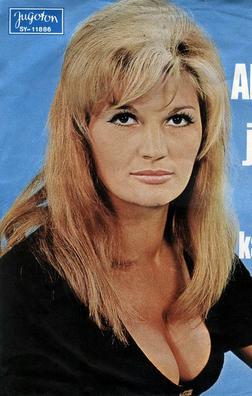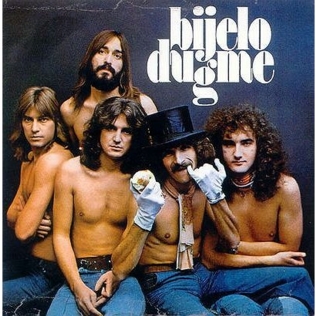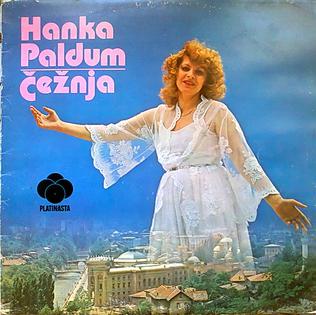Nada Obrić is a Bosnian Serb folk singer.

Crvena jabuka is a Bosnian pop rock band formed in Sarajevo, SR Bosnia and Herzegovina in 1985. Since then, they had great success and are still very popular. They were a part of the New primitives movement that started during the 80s.

Hajrudin "Hari" Varešanović is a Bosnian musician. Varešanović remains the vocal soloist, primary composer and lyricist for the musical group Hari Mata Hari.

Kemal Monteno was a Bosnian recording artist and singer-songwriter whose career stretched from the 1960s to the 2010s. He is widely considered one of the greatest songwriters of the former Yugoslavia.

Zilha Armenulić, known professionally as Silvana Armenulić, was a Bosnian singer-songwriter and actress and one of the most prominent commercial folk music and traditional sevdalinka singers in Yugoslavia. She is called the "Queen of Sevdalinka". Her life was cut short when she died in a car crash at the age of 37, but she continues to be well regarded in the region and she is recognized for her unique singing style and voice. Armenulić's song "Šta će mi život", written by her friend and contemporary Toma Zdravković, is one of the best-selling singles from the former Yugoslavia.

Bijelo Dugme was a Yugoslav rock band, formed in Sarajevo, SR Bosnia and Herzegovina in 1974. Bijelo Dugme is widely considered to have been the most popular band ever to exist in the former Socialist Federal Republic of Yugoslavia and one of the most notable acts of the Yugoslav rock scene and Yugoslav popular music in general.

Hanka Paldum is a Bosnian sevdalinka singer and founder of the record label Sarajevo Disk. She is regarded as one of the best female sevdah performers of the 20th century and is popular in her home country of Bosnia as well as in the rest of the former Yugoslavia.

Hari Mata Hari is a Bosnian pop band. Hari Mata Hari is the stage name for the singer Hari Varešanović. The group originated from the city of Sarajevo, the capital of Bosnia and Herzegovina. The group has performed over 1,000 concerts and sold 5 million albums to date. Their songs are among the most famous and popular love ballads in the former Yugoslavia era. Hari Mata Hari was the representative of Bosnia and Herzegovina at the Eurovision Song Contest 2006 held in Athens, Greece. Coincidentally, hari mata hari in Malay stands for 'day of the sun, or Sunday'.
Šemsa Suljaković is a Bosnian folk singer.
Milić "Mića" Vukašinović is a Serbian and Yugoslav musician and songwriter, best known as the vocalist, guitarist and songwriter of the hard rock and heavy metal band Vatreni Poljubac. Vukašinović has also recorded a number of solo albums, and was a one-time drummer for popular rock bands Indexi and Bijelo Dugme.
Sead "Sejo" Kalač is a pop-folk singer.
Olivera Katarina, also previously known as Olivera Vučo and Olivera Šakić, is a Serbian actress, singer and writer. She was one of the leading stars of Yugoslav cinema in the 1960s and the 1970s, and is probably the best known for her performance in Aleksandar Petrović's film I Even Met Happy Gypsies (1967), which won the Grand Prix at the 1967 Cannes Film Festival.
Grupa Regina is a Bosnian rock band founded in 1989 in Sarajevo, Bosnia and Herzegovina, then part of Yugoslavia. The band has so far released eleven studio albums, one compilation album and two singles.

Čežnja is the fourth studio album by Bosnian folk singer Hanka Paldum. It was released 29 October 1980 through Sarajevo Disk.

Tebi ljubavi is the seventh studio album by Bosnian folk singer Hanka Paldum. It was released 27 March 1984 through the record label Jugodisk.

Predrag Gojković, better known by his nickname Cune, was a Serbian vocalist and recording artist with a career spanning six decades.

Zumreta Midžić, known by her stage name Zuzi Zu, is a popular Bosnian singer, musician and songwriter. She performs various music genres from pop-rock to Bosnian folk - sevdalinka and Gypsy music. She was born in Velika Kladuša, Bosnia and Herzegovina and for many years she was living and working in Sarajevo.

Vatreni Poljubac is a hard rock and heavy metal band, originally formed in 1977 in Sarajevo, SR Bosnia and Herzegovina, SFR Yugoslavia, and currently based in Belgrade, Serbia. Formed and led by vocalist, guitarist and songwriter Milić Vukašinović, Vatreni Poljubac was one the most notable acts of the Yugoslav hard rock and heavy metal scene.

Voljela sam oči nevjerne is the debut studio album by Bosnian folk singer Hanka Paldum. It was released 13 February 1974 through the record label Diskoton.

Zorica Kondža is a Croatian pop-rock singer. She is best known for her soprano vocal range, which she displayed as the lead vocalist for the 1980s pop-rock music act Stijene. Since 1981, she had participated in most of the Split Festivals until 2014, which she had won 7 times. Other than the Split festivals, she also took part in various other jamborees in Croatia, such as the Zadarfest, Dora and Mesam. She began her solo career in 1984, which gained her success in Croatia and neighbouring countries.













